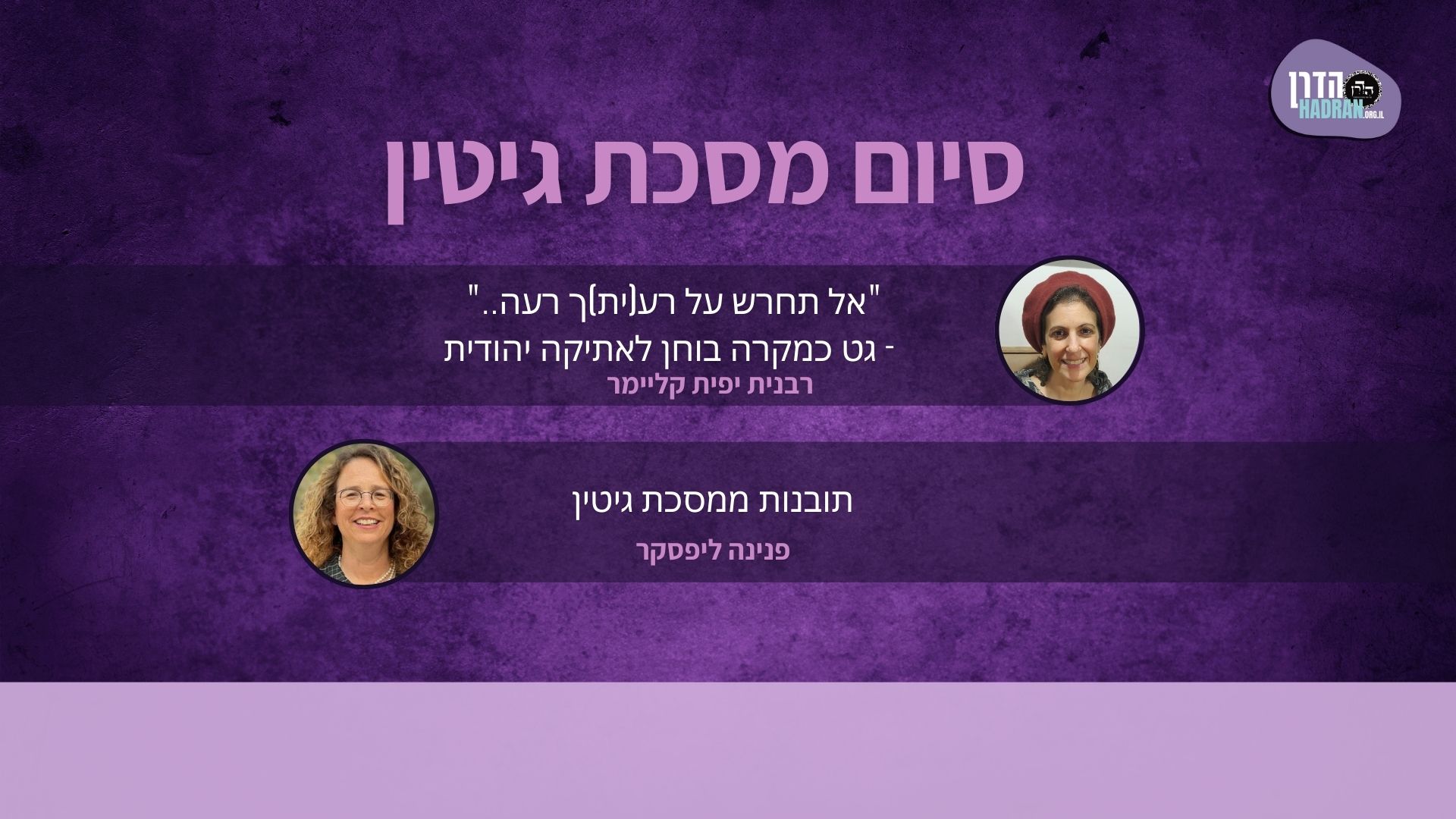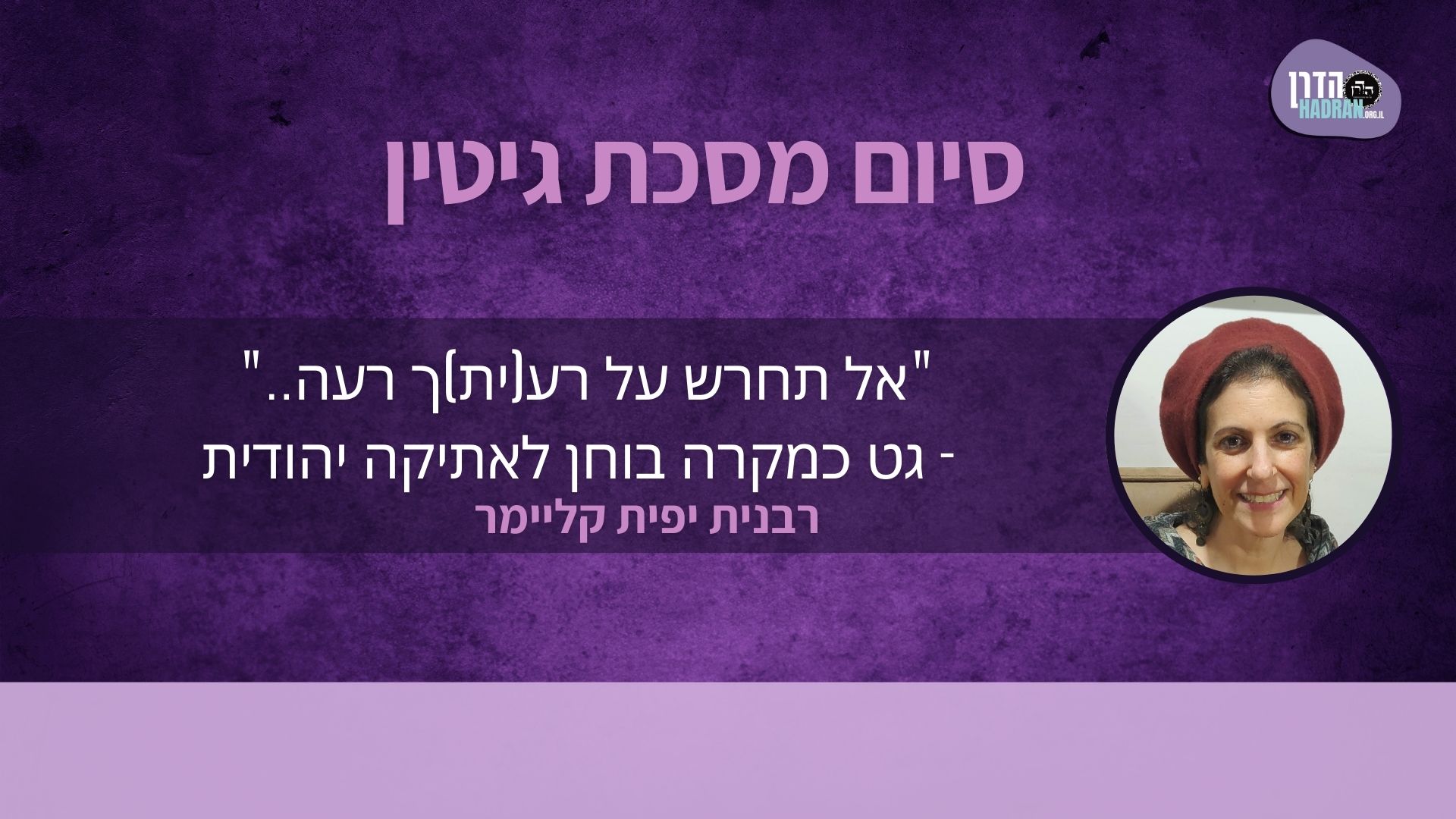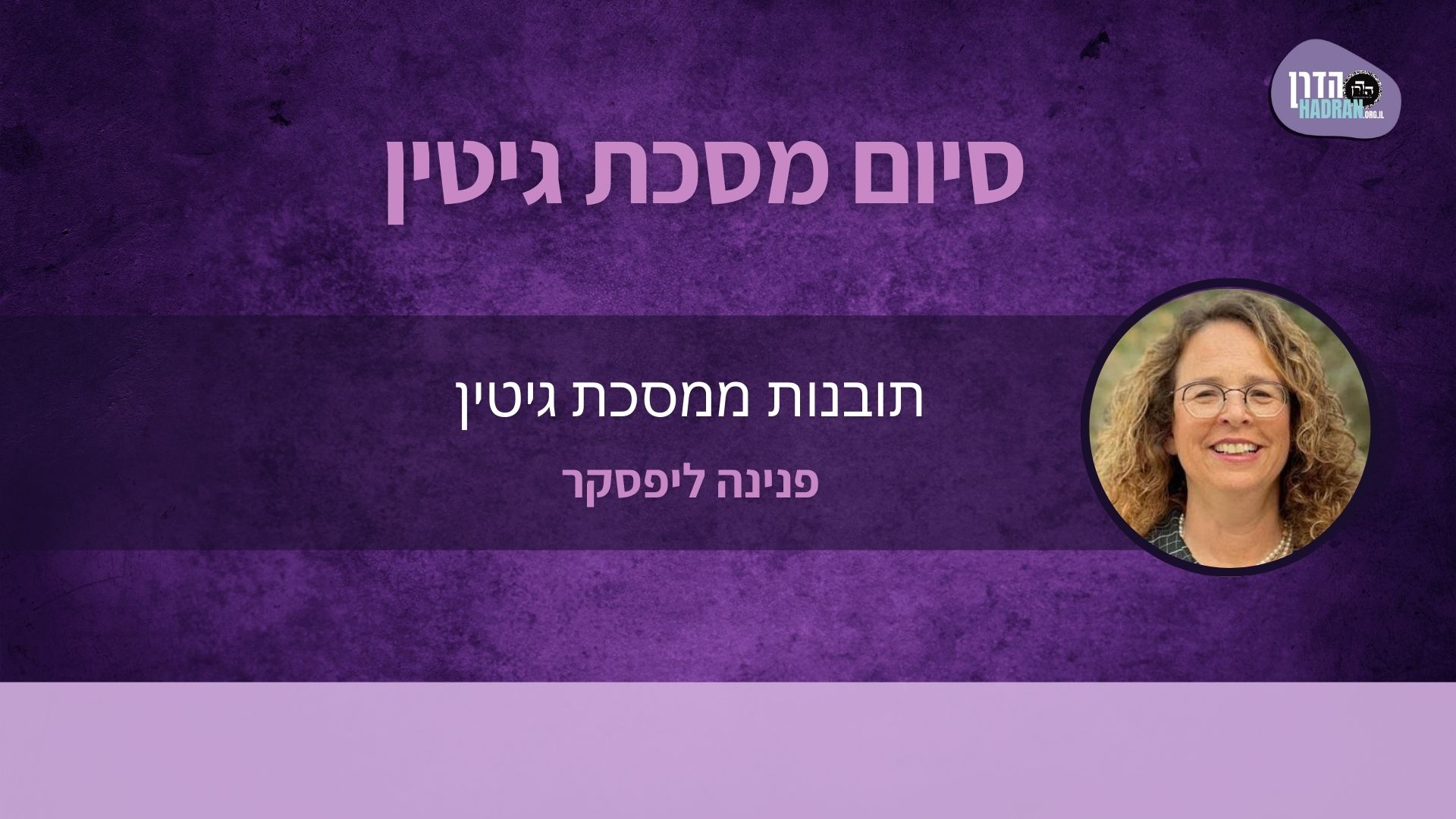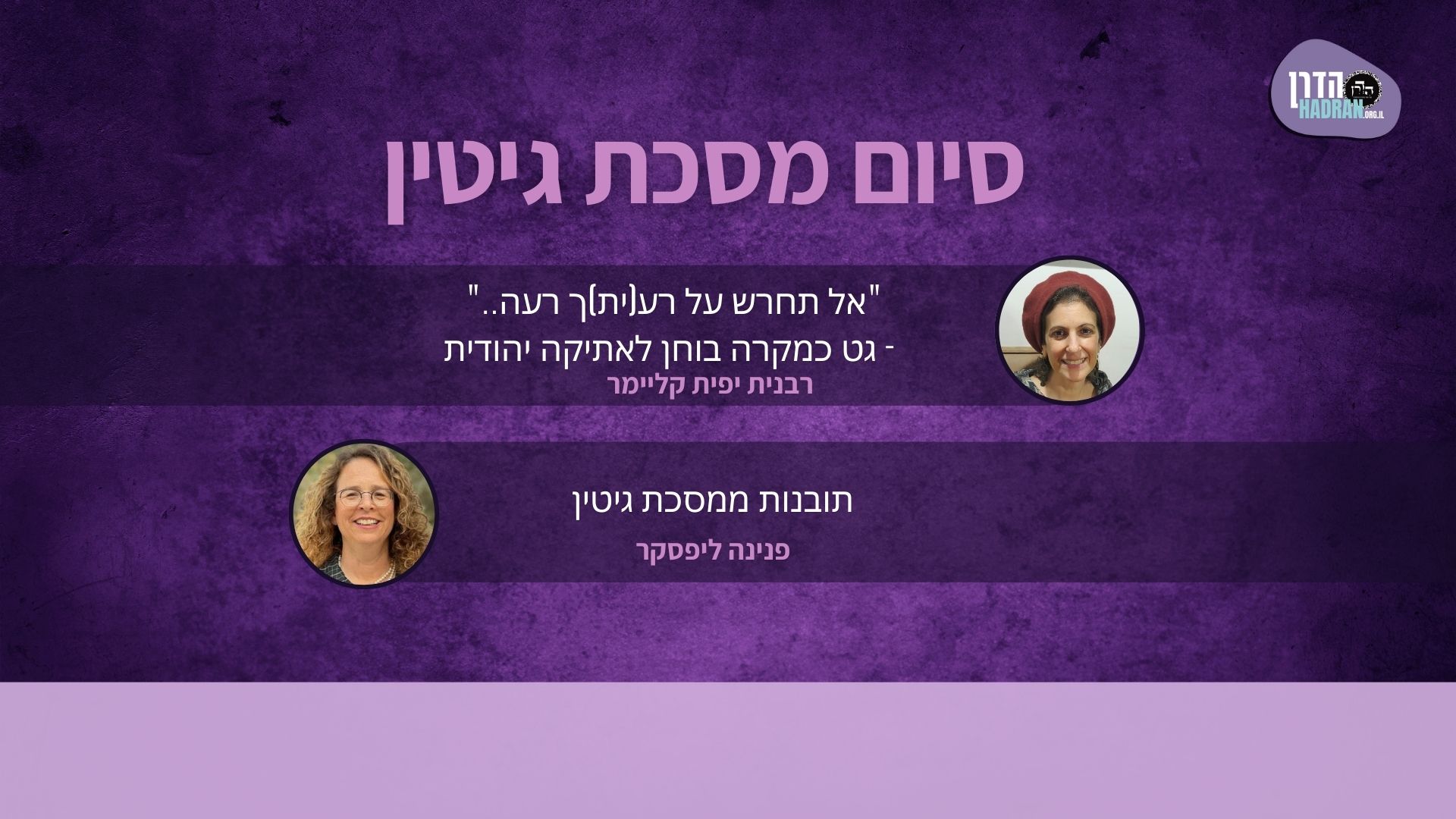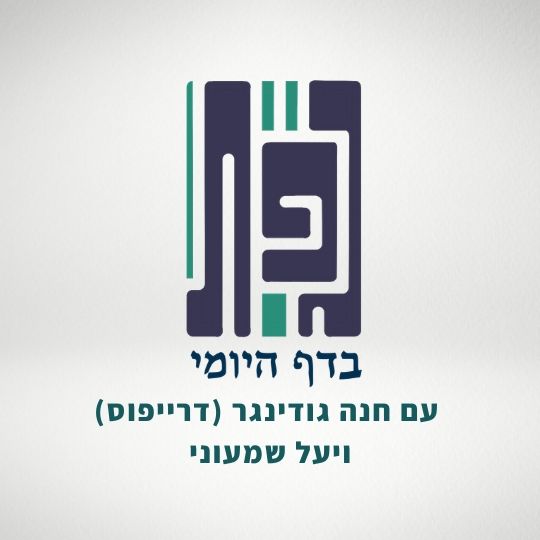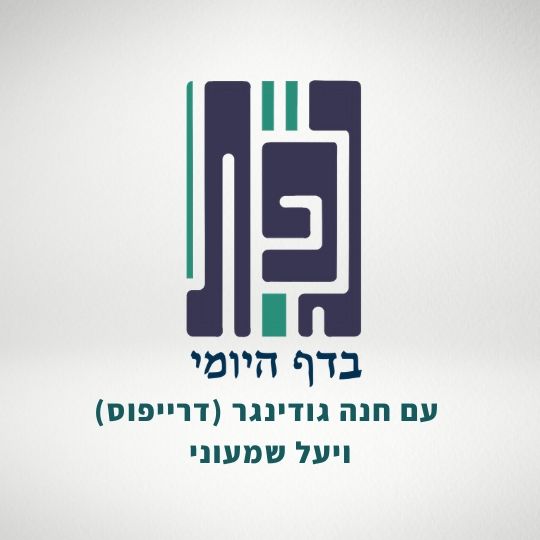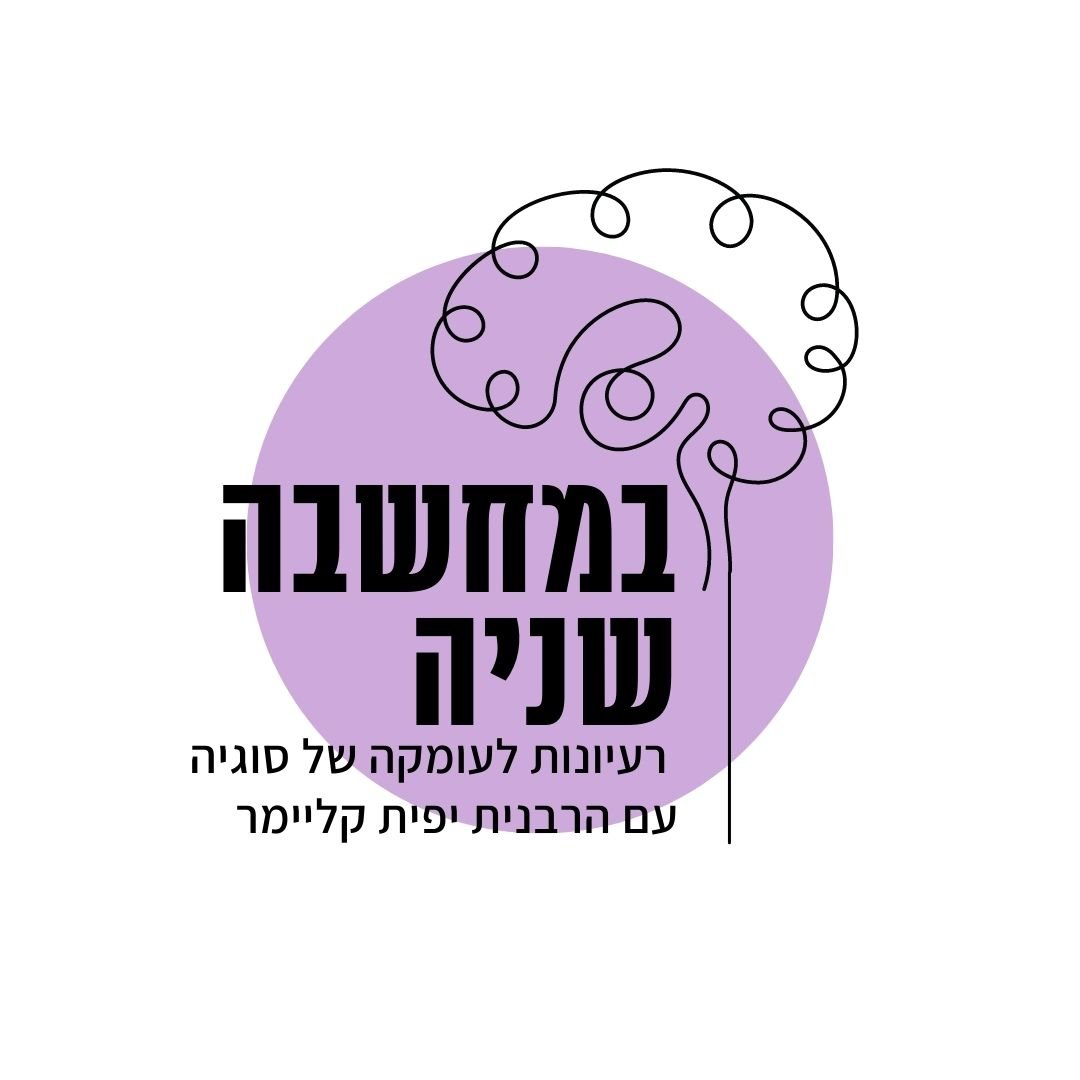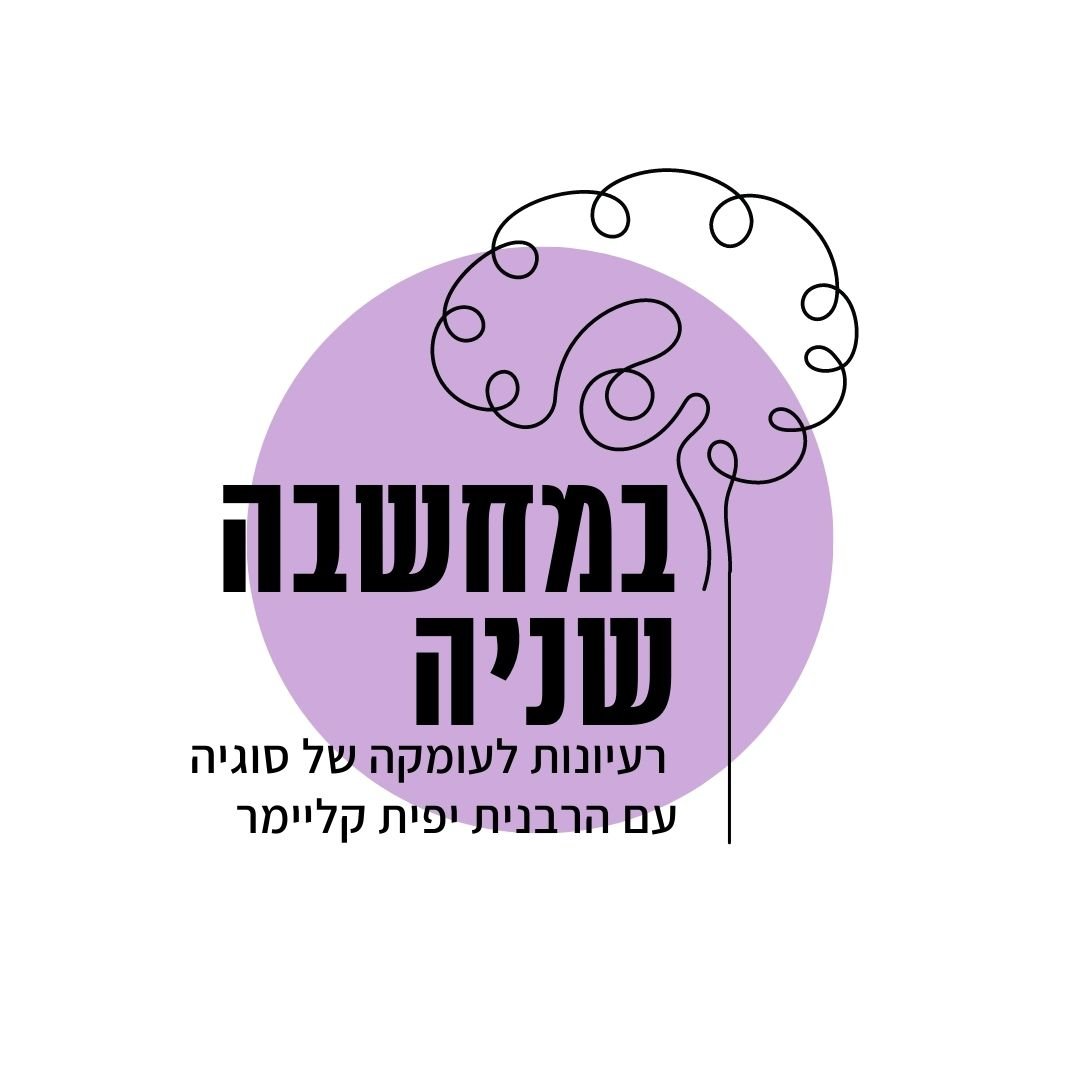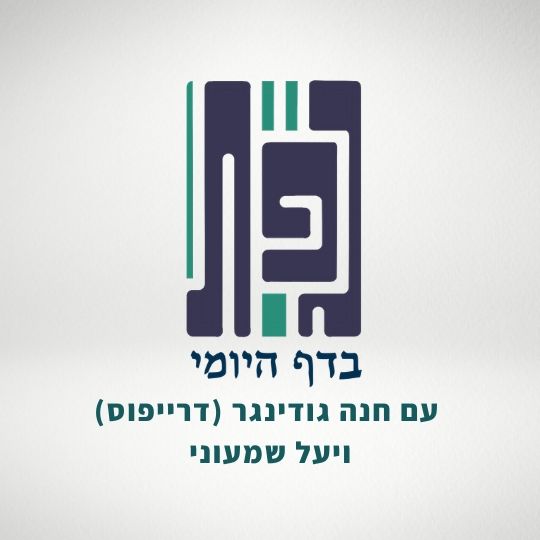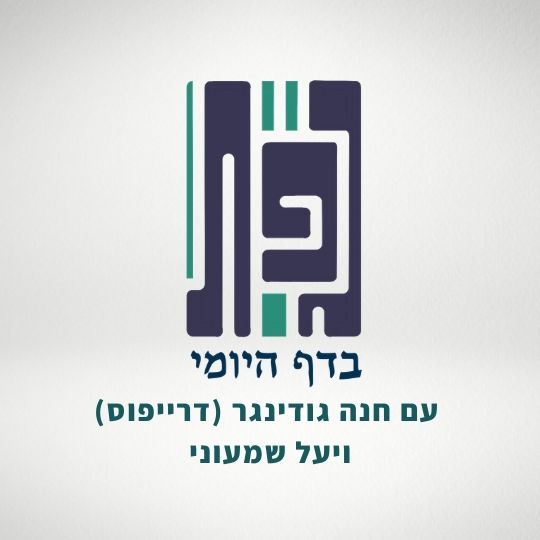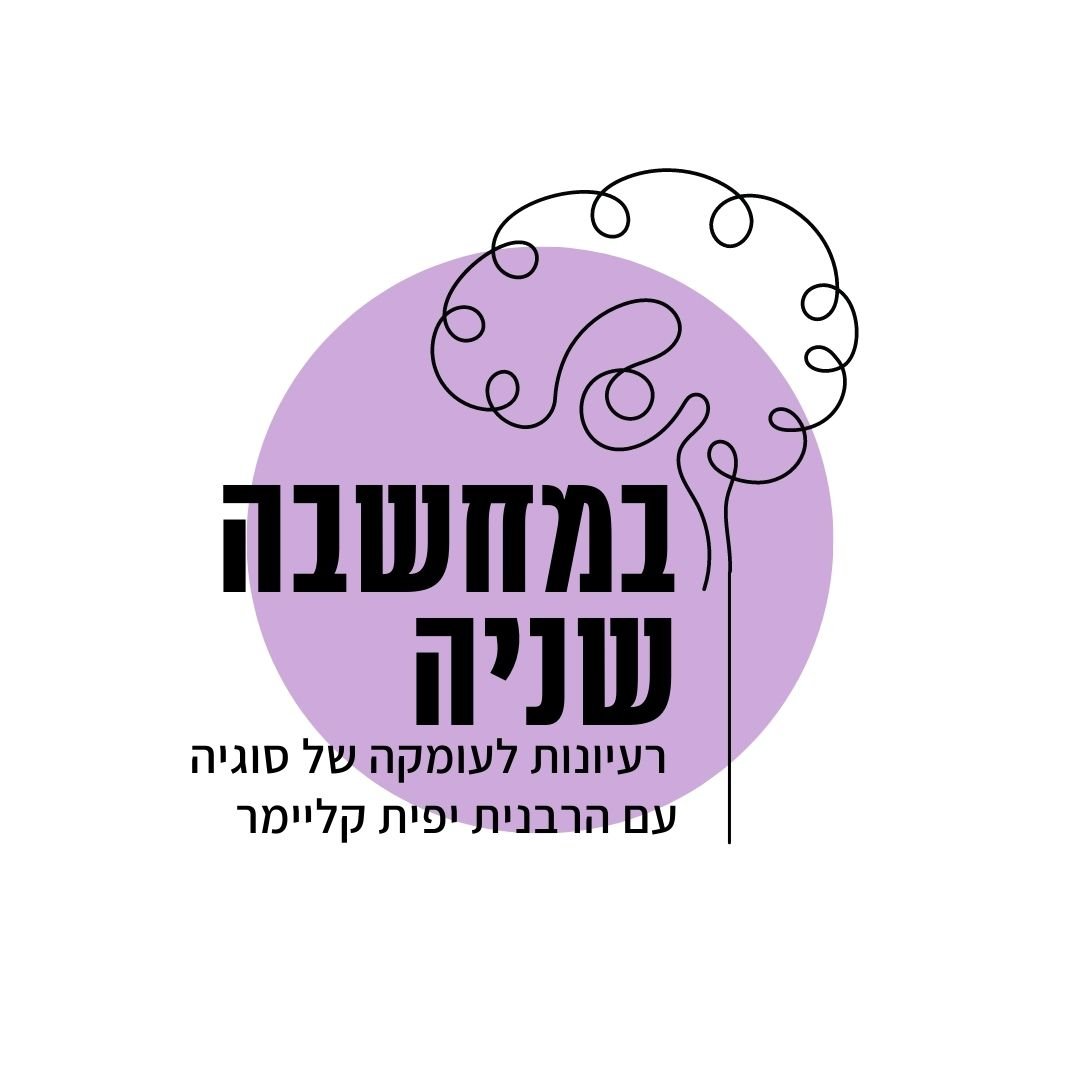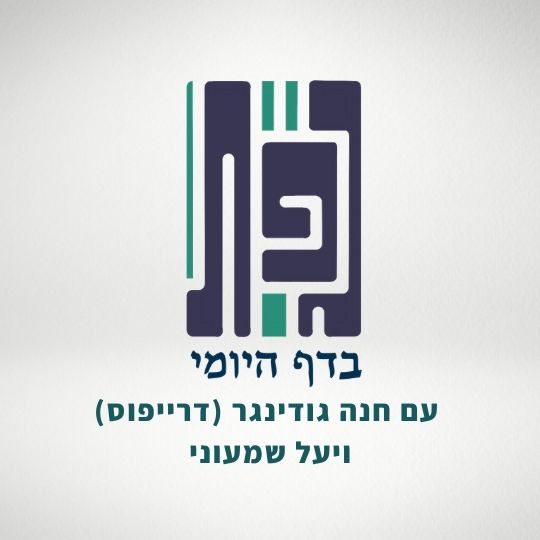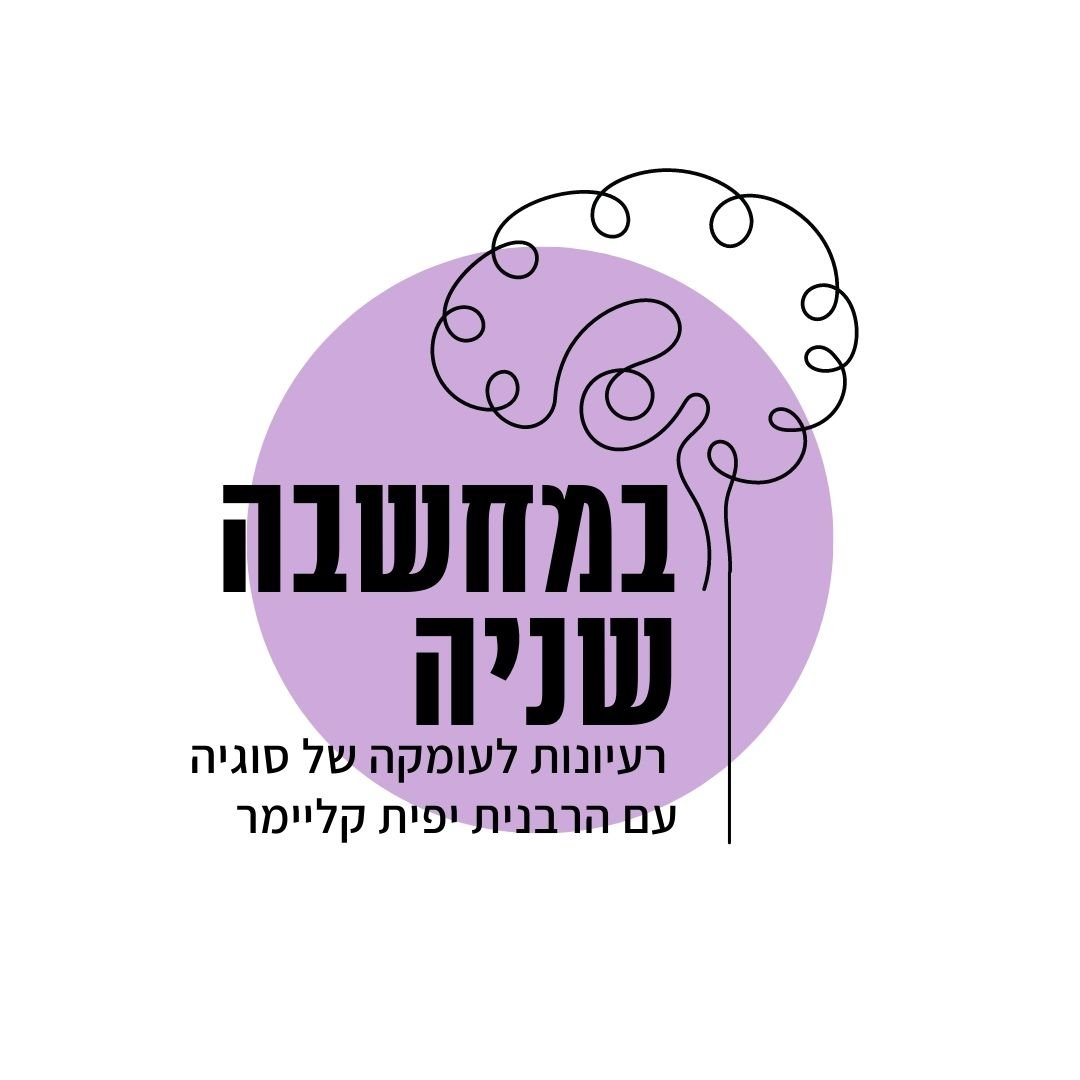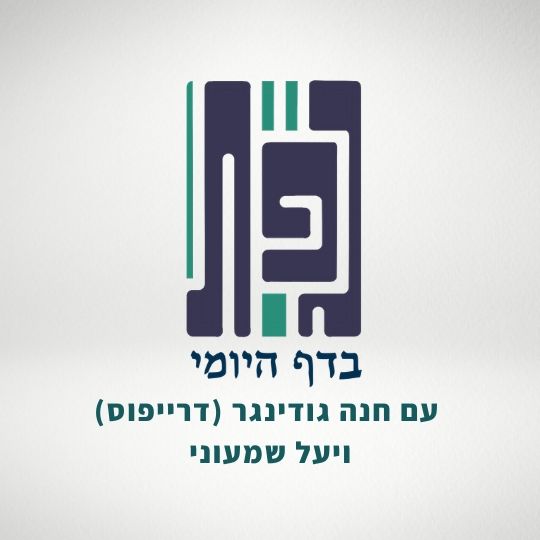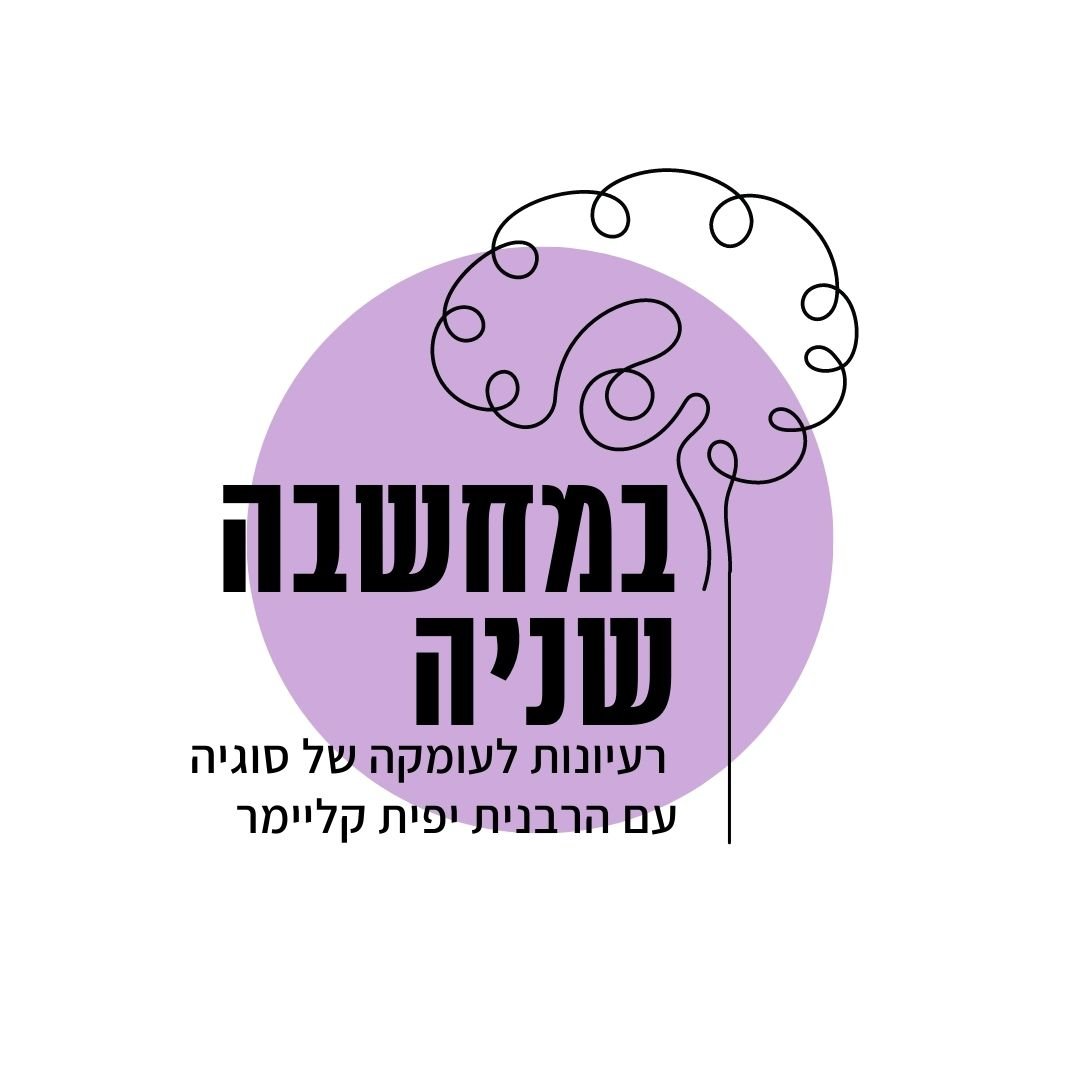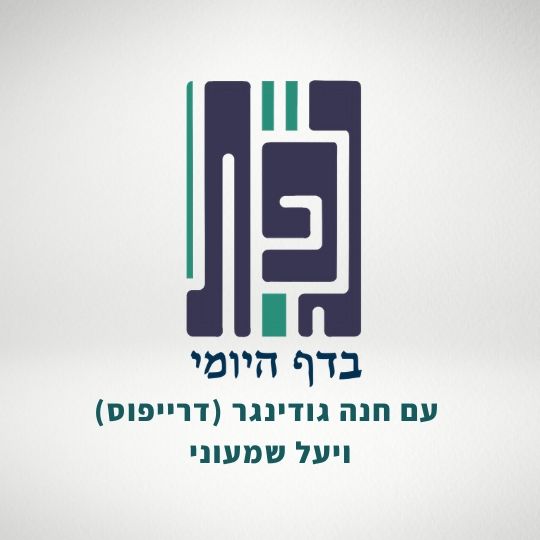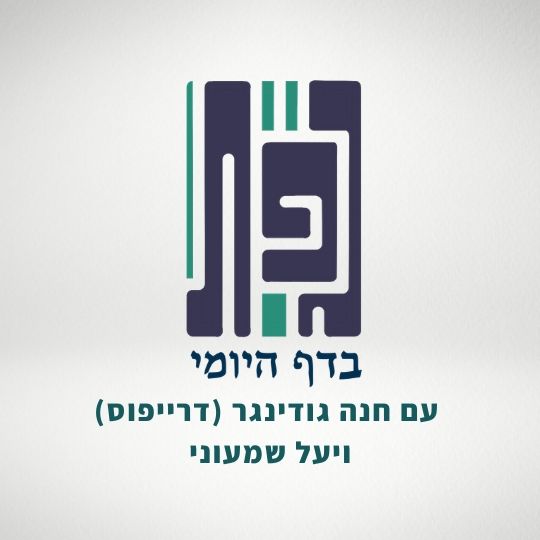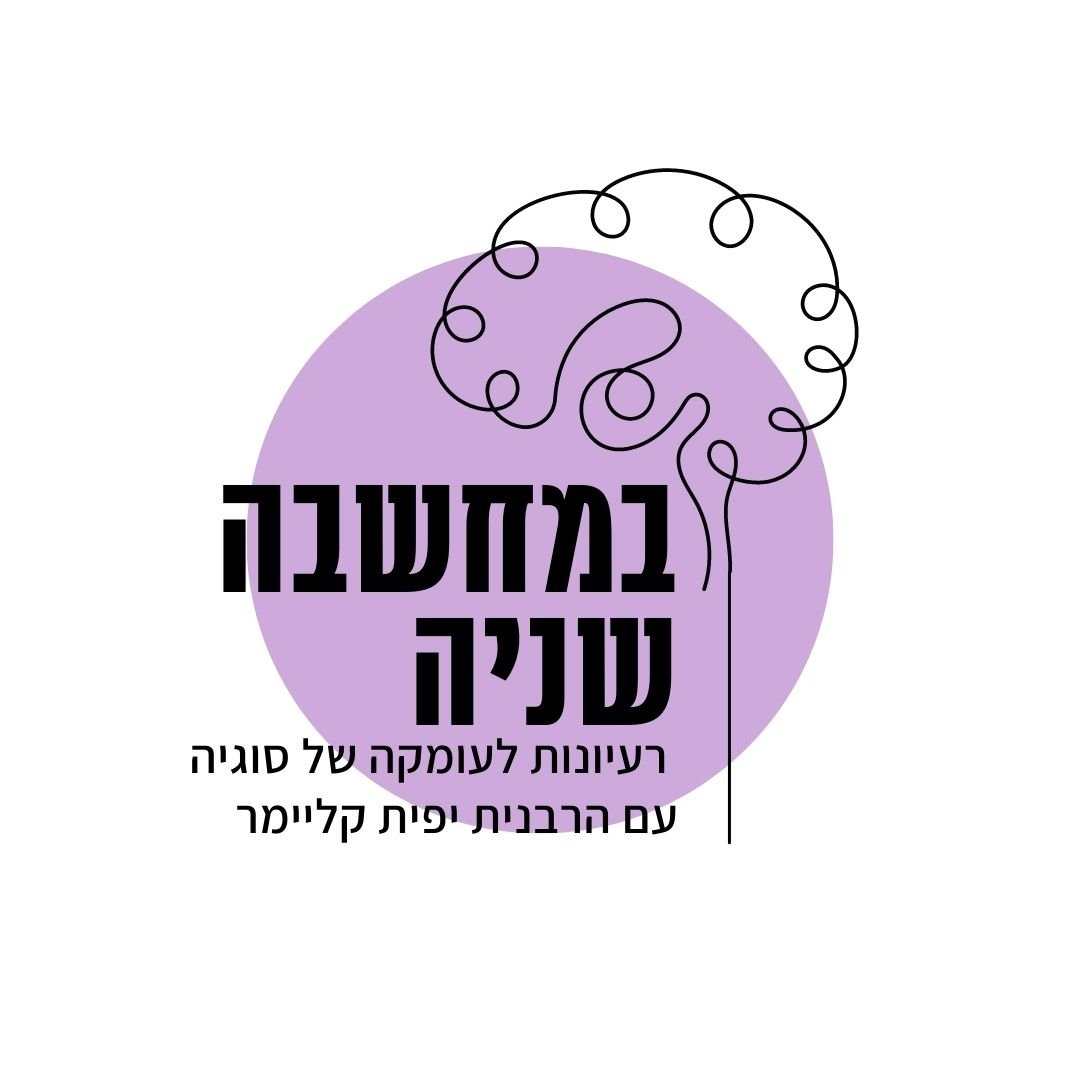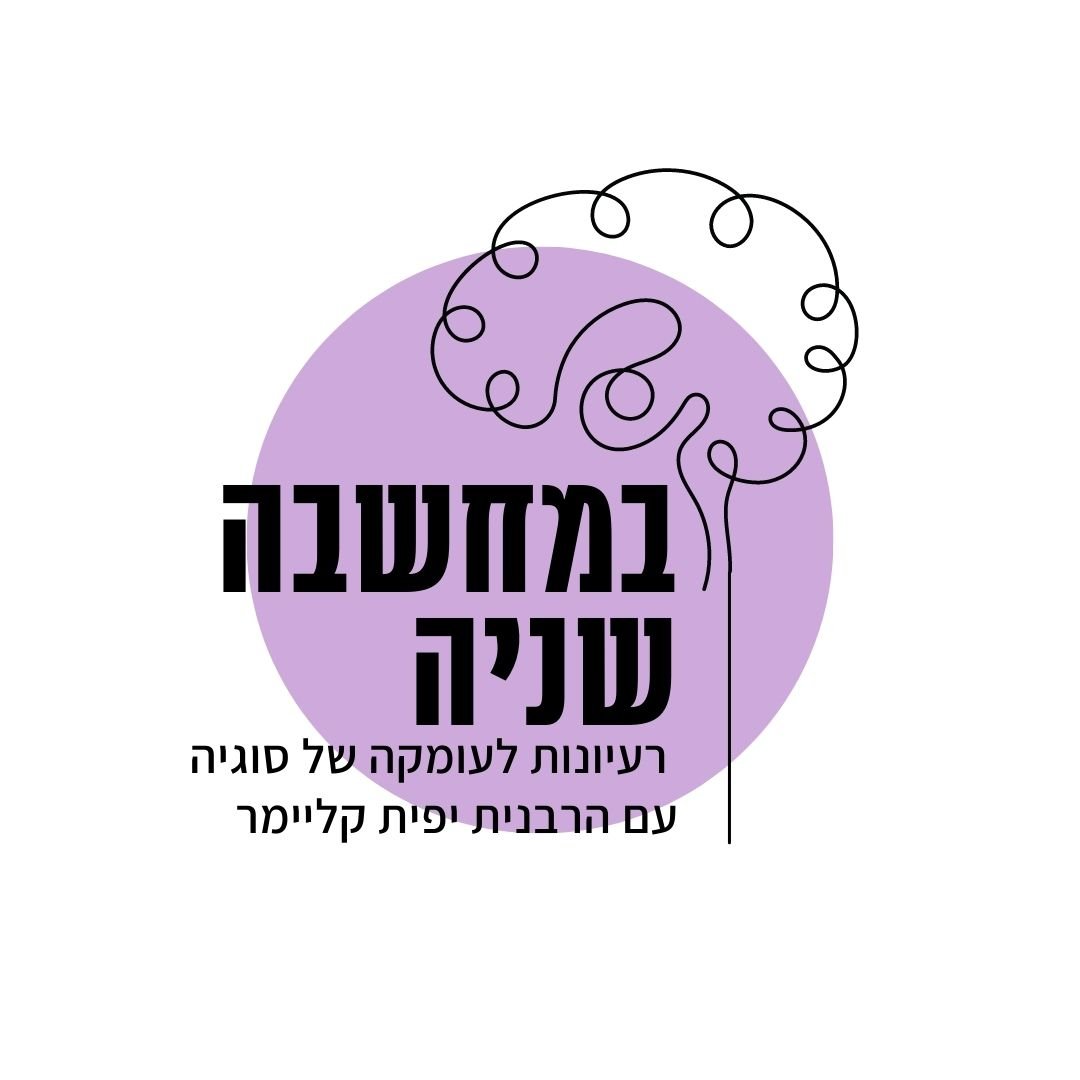גיטין יא
בְּשֵׁמוֹת מוּבְהָקִין.
We are dealing with unambiguous gentile names, in which case there is no need to be concerned that people might rely on these individuals as witnesses for the transfer, as it is evident that they are gentiles.
הֵיכִי דָּמֵי שֵׁמוֹת מוּבְהָקִין? אָמַר רַב פָּפָּא, כְּגוֹן: הוֹרְמִיז, וַאֲבוּדַיָּנָא, בַּר שִׁיבְתַּאי, וּבַר קִידְרֵי, וּבָאטִי, וּנְקִים אוּנָּא.
The Gemara clarifies: What are the circumstances of unambiguous gentile names? Rav Pappa said: This is referring to names such as Hurmiz, and Abbudina, bar Shibbetai, and bar Kidri, and Bati, and Nakim Una.
אֲבָל שֵׁמוֹת שֶׁאֵין מוּבְהָקִים מַאי – לָא?! אִי הָכִי, אַדְּתָנֵי סֵיפָא: לֹא הוּזְכְּרוּ אֶלָּא בִּזְמַן שֶׁנַּעֲשׂוּ בְּהֶדְיוֹט; לִפְלוֹג וְלִיתְנֵי בְּדִידַהּ: בַּמֶּה דְּבָרִים אֲמוּרִים – בְּשֵׁמוֹת מוּבְהָקִין, אֲבָל שֵׁמוֹת שֶׁאֵין מוּבְהָקִין – לָא!
The Gemara infers: However, if the bill of divorce or manumission was signed by gentile witnesses with ambiguous names, what is the halakha? Is this not a valid document? If so, instead of teaching in the latter clause of the mishna: These two types of documents are mentioned only when they are prepared by a common person, not in court, let him distinguish and teach the distinction within the case of gentile courts itself, as follows: In what case is this statement, that gentile signatures are valid for a bill of divorce or manumission, said? With regard to unambiguous names. However, in a case of ambiguous names, no, gentile witnesses are not valid.
הָכִי נָמֵי קָאָמַר: בַּמֶּה דְּבָרִים אֲמוּרִים – בְּשֵׁמוֹת מוּבְהָקִין, אֲבָל בְּשֵׁמוֹת שֶׁאֵין מוּבְהָקִין, נַעֲשָׂה כְּמִי שֶׁנַּעֲשׂוּ בְּהֶדְיוֹט, וּפְסוּלִין.
The Gemara answers: That is also what he is saying, i.e., Rabbi Shimon’s statement that these bills of divorce and bills of manumission are also valid should be understood in this very manner: In what case is this statement said? With regard to unambiguous names. However, with regard to ambiguous names, the document becomes like one that was prepared by a common person, and therefore such documents are invalid.
וְאִיבָּעֵית אֵימָא: סֵיפָא אֲתָאן לְגִיטֵּי מָמוֹן, וְהָכִי קָאָמַר: לֹא הוּזְכְּרוּ גִּיטֵּי מָמוֹן דִּפְסוּלִים, אֶלָּא בִּזְמַן שֶׁנַּעֲשׂוּ בְּהֶדְיוֹט.
And if you wish, say a different answer: In the last clause of the mishna, which states: These types of documents are mentioned only when they are prepared by a common person, we are no longer discussing bills of divorce; rather, we arrive at the case of financial documents. Furthermore, this clause of the mishna is not a continuation of Rabbi Shimon’s statement, as it returns to the opinion of the first tanna. And this is what the mishna is saying: Financial documents were mentioned as invalid only when they were prepared by a common person, whereas if they were produced by a court they are valid.
תַּנְיָא: אָמַר רַבִּי אֶלְעָזָר בְּרַבִּי יוֹסֵי, כָּךְ אָמַר רַבִּי שִׁמְעוֹן לַחֲכָמִים בְּצַיְדָּן: לֹא נֶחְלְקוּ רַבִּי עֲקִיבָא וַחֲכָמִים עַל כׇּל הַשְּׁטָרוֹת הָעוֹלִין בְּעַרְכָּאוֹת שֶׁל גּוֹיִם, שֶׁאַף עַל פִּי שֶׁחוֹתְמֵיהֶן גּוֹיִם – כְּשֵׁרִים, וַאֲפִילּוּ גִּיטֵּי נָשִׁים וְשִׁחְרוּרֵי עֲבָדִים; לֹא נֶחְלְקוּ אֶלָּא בִּזְמַן שֶׁנַּעֲשׂוּ בְּהֶדְיוֹט – שֶׁרַבִּי עֲקִיבָא מַכְשִׁיר, וַחֲכָמִים פּוֹסְלִים – חוּץ מִגִּיטֵּי נָשִׁים וְשִׁחְרוּרֵי עֲבָדִים.
It is taught in a baraita (Tosefta 1:4): Rabbi Elazar, son of Rabbi Yosei, said that Rabbi Shimon said this to the Sages in the city of Tzaidan: Rabbi Akiva and the Rabbis did not disagree with regard to all documents produced in gentile courts, that even though their signatories are gentiles, these documents are valid, even in the case of bills of divorce and bills of manumission. They disagreed only when they were prepared by a common person, outside a court, as Rabbi Akiva deems a document of this kind valid, and the Rabbis deem it invalid, except for bills of divorce and bills of manumission.
רַבָּן שִׁמְעוֹן בֶּן גַּמְלִיאֵל אוֹמֵר: אַף אֵלּוּ – כְּשֵׁירִין בִּמְקוֹם שֶׁאֵין יִשְׂרָאֵל חוֹתְמִין, אֲבָל בִּמְקוֹם שֶׁיִּשְׂרָאֵל חוֹתְמִין – לָא.
Rabban Shimon ben Gamliel says: Even these, bills of divorce and manumission, are valid in a place where Jews do not sign. In other words, the halakha that a document with gentile signatories is valid applies only in a place where Jews are not allowed to sign, as everyone knows that gentile documents are not signed by Jews. However, in a place where Jews sign, no, these documents are not valid either, as people might mistakenly think that Jews signed this bill of divorce. Therefore there is a concern that one might deliver this bill of divorce in the presence of those witnesses, who are actually gentiles, which would render the bill of divorce invalid.
מְקוֹם שֶׁאֵין יִשְׂרָאֵל חוֹתְמִין נָמֵי, לִיגְזוֹר אַטּוּ מְקוֹם שֶׁיִּשְׂרָאֵל חוֹתְמִין! שֶׁמָּא בִּשְׁמָא מִחַלַּף, אַתְרָא בְּאַתְרָא לָא מִחַלַּף.
The Gemara suggests: Let us also decree in a place where Jews do not sign due to a place where Jews do sign. The Gemara answers: One might confuse one name with another name. It is possible that one might think that a certain name is that of a Jew when it is actually that of a gentile. However, one is not likely to confuse one place with another place. Since everyone knows that all of the signatures in certain places belong to gentiles, they are careful not to transfer a bill of divorce in the presence of the witnesses who signed it, unless they are certain that the witnesses are Jews.
רָבִינָא סָבַר לְאַכְשׁוֹרֵי בִּכְנוּפְיָאתָה דְאַרְמָאֵי, אֲמַר לֵיהּ רַפְרָם: ״עַרְכָּאוֹת״ תְּנַן.
§ The Gemara relates that Ravina thought to deem valid a document that was written by a group of gentiles [arma’ei]. Rafram said to him that we learned: Gentile courts, in the mishna, i.e., these documents are valid only if they were produced in an important court, not by every group of gentiles.
אָמַר רָבָא: הַאי שְׁטָרָא פָּרְסָאָה, דְּמַסְרֵיהּ נִיהֲלֵיהּ בְּאַפֵּי סָהֲדֵי יִשְׂרָאֵל – מַגְבִּינַן בֵּיהּ מִבְּנֵי חָרֵי.
Similarly, Rava said: With regard to this Persian document [shetara parsa’a] written by the Persian authorities that was transferred to the recipient in the presence of Jewish witnesses, he can collect with it non-liened property, i.e., property that is unencumbered by a mortgage. Although this is not considered a proper document by means of which one can collect from any land sold by the debtor, nevertheless, the facts in the document are considered accurate, and therefore one may at least collect non-liened property with it.
וְהָא לָא יָדְעִי לְמִיקְרֵא? בִּדְיָדְעִי.
The Gemara asks: But the witnesses for the transmission of this document do not know how to read Persian, as most Jews did not read that language. If so, how can they serve as witnesses? The Gemara answers: Rava is referring to a situation where the witnesses know how to read Persian.
וְהָא בָּעֵינָא כְּתָב שֶׁאֵינוֹ יָכוֹל לְזַיֵּיף, וְלֵיכָּא! בְּדַאֲפִיצָן. וְהָא בָּעֵינָא ״צָרִיךְ שֶׁיַּחֲזִיר מֵעִנְיָנוֹ שֶׁל שְׁטָר בְּשִׁיטָה אַחֲרוֹנָה״, וְלֵיכָּא! בִּדְמַהְדַּר.
The Gemara questions how the court can rely upon such a document: But I require that the document be written in a manner that cannot be forged, and it is not so in this document, as the Persians were not particular about preparing their documents in this manner when writing their legal documents. The Gemara explains: Rava’s statement applies in a case where the paper of the documents was processed with gall. Consequently, it is not possible to forge the writing (see 19b). But I require that a document review the essential topic of the document in its last line, and it is not so in the case of Persian documents. The Gemara answers: Rava’s statement applies in a case where it returned to review the essential topic of the document in the final line.
אִי הָכִי מִמְּשַׁעְבְּדִי נָמֵי! לֵית לֵיהּ קָלָא.
The Gemara asks: If so, he should be able to collect from liened property as well, as this document is equivalent to one written by a Jew. Why doesn’t Rava say that it can be used to collect from liened property as well? The Gemara answers: The reason is that this document does not generate publicity, i.e., a legal matter that is performed in a Persian court will not become publicized among Jews. Therefore, this case is similar to a loan by oral agreement, where the transaction is not publicized. In this case the lender can collect only from non-liened property, as purchasers from the debtor would not have been aware of his debt and consequently taken sufficient measures to ensure that the money would not be claimed from their purchase.
בְּעָא מִינֵּיהּ רֵישׁ לָקִישׁ מֵרַבִּי יוֹחָנָן:
Reish Lakish raised a dilemma before Rabbi Yoḥanan:
עֵדִים הַחֲתוּמִין עַל הַגֵּט וּשְׁמוֹתָן כְּשֵׁמוֹת גּוֹיִם, מַהוּ? אֲמַר לֵיהּ: לָא בָּא לְיָדֵינוּ אֶלָּא לוֹקוּס וְלוּס, וְהִכְשַׁרְנוּ.
With regard to witnesses who signed a bill of divorce and whose names are like the names of gentiles, what is the halakha? Rabbi Yoḥanan said to him: There came before us bills of divorce that were signed only with names such as Lukos and Los, and we deemed them valid by means of the witnesses of transmission.
וְדַוְקָא לוֹקוּס וְלוּס, דְּלָא שְׁכִיחִי יִשְׂרָאֵל דְּמַסְּקִי בִּשְׁמָהָתַיְיהוּ, אֲבָל שְׁמָהָתָא אַחֲרִינֵי דִּשְׁכִיחִי יִשְׂרָאֵל דְּמַסְּקִי בִּשְׁמָהָתַיְיהוּ – לָא.
The Gemara infers: And this applies specifically to names such as Lukos and Los, as it is uncommon to find Jews who are called by these names. However, with regard to other gentile names, concerning which it is common to find Jews who are called by these names, no, the documents are not valid, as people might mistakenly rely on the signatures of gentiles.
אֵיתִיבֵיהּ: גִּיטִּין הַבָּאִים מִמְּדִינַת הַיָּם וְעֵדִים חֲתוּמִים עֲלֵיהֶם, אַף עַל פִּי שֶׁשְּׁמוֹתֵיהֶן כִּשְׁמוֹת גּוֹיִם – כְּשֵׁירִין, מִפְּנֵי שֶׁרוֹב יִשְׂרָאֵל שֶׁבְּחוּצָה לָאָרֶץ שְׁמוֹתֵיהֶן כִּשְׁמוֹת גּוֹיִם.
Reish Lakish raised an objection to this ruling from a baraita (Tosefta 4:8): With regard to bills of divorce that come from a country overseas, and witnesses are signed upon them, even though the names of the witnesses are like the names of gentiles, they are valid, because the names of most Jews outside of Eretz Yisrael are like the names of gentiles. This indicates that a bill of divorce is valid even when the names are not clearly those of gentiles.
הָתָם, כִּדְקָתָנֵי טַעְמָא: מִפְּנֵי שֶׁרוֹב יִשְׂרָאֵל שֶׁבְּחוּצָה לָאָרֶץ שְׁמוֹתֵיהֶן כִּשְׁמוֹת גּוֹיִם.
The Gemara answers: There the halakha is different, as it teaches the reason explicitly: Because the names of most Jews outside of Eretz Yisrael are like the names of gentiles. Consequently, it can be assumed that the court examined the matter at the time of the signing, and that the document was signed by Jews. However, in Eretz Yisrael it is more likely that ambiguous names are actually those of gentiles, and therefore a document of this kind is valid only when it is clear it was signed by gentiles, to avoid mistakes.
וְאִיכָּא דְּאָמְרִי, כִּי מַתְנִיתָא בְּעָא מִינֵּיהּ, וּפְשַׁט לֵיהּ מִמַּתְנִיתָא.
This was one version of the discussion. And there are those who say that Reish Lakish asked Rabbi Yoḥanan about the very same case as in the baraita, and he resolved the matter for him from the baraita, that even if the names signed on a bill of divorce brought from outside of Eretz Yisrael are like the names of gentiles, they are valid.
מַתְנִי׳ הָאוֹמֵר ״תֵּן גֵּט זֶה לְאִשְׁתִּי, וּשְׁטַר שִׁחְרוּר זֶה לְעַבְדִּי״, אִם רָצָה לַחֲזוֹר בִּשְׁנֵיהֶן – יַחְזוֹר, דִּבְרֵי רַבִּי מֵאִיר.
MISHNA: With regard to one who says to another: Give this bill of divorce to my wife, or: Give this bill of manumission to my slave, if before the document reaches the woman or the slave the giver wishes to retract his decision, then with regard to both of them, he can retract. This is the statement of Rabbi Meir.
וַחֲכָמִים אוֹמְרִים: בְּגִיטֵּי נָשִׁים, אֲבָל לֹא בְּשִׁחְרוּרֵי עֲבָדִים; לְפִי שֶׁזָּכִין לָאָדָם שֶׁלֹּא בְּפָנָיו, וְאֵין חָבִין לוֹ אֶלָּא בְּפָנָיו;
And the Rabbis say: One can retract his decision in the case of bills of divorce but not in the case of bills of manumission. The Rabbis explain the reason for their ruling: This is because one can act in a person’s interest in his absence, and therefore the agent acquires the document on behalf of the slave from the moment the owner hands the bill of manumission to the agent. But one can act to a person’s detriment only in his presence. The receipt of a bill of divorce is considered to be to a woman’s detriment, and therefore an agent cannot receive it for her without her consent.
שֶׁאִם יִרְצֶה שֶׁלֹּא לָזוּן אֶת עַבְדּוֹ – רַשַּׁאי, וְשֶׁלֹּא לָזוּן אֶת אִשְׁתּוֹ – אֵינוֹ רַשַּׁאי.
They explain further: The emancipation of a slave is in his interests, despite the fact that he receives sustenance from his master while a slave, as, if the master wishes not to sustain his slave he is allowed not to provide him with sustenance. This demonstrates that slavery is not in the interest of the slave, as he does not receive any guaranteed benefit. But if a husband wishes not to sustain his wife, he is not allowed to proceed in this manner. Consequently, marriage is in the interests of the woman.
אָמַר לָהֶם: וַהֲרֵי הוּא פּוֹסֵל אֶת עַבְדּוֹ מִן הַתְּרוּמָה, כְּשֵׁם שֶׁהוּא פּוֹסֵל אֶת אִשְׁתּוֹ! אָמְרוּ לוֹ: מִפְּנֵי שֶׁהוּא קִנְיָינוֹ.
Rabbi Meir said to the Rabbis: But even so, it is not in the interest of a slave to be emancipated, as, if his master is a priest, he disqualifies his slave from partaking of teruma by emancipating him, just as a husband who is a priest disqualifies his Israelite wife from partaking of teruma by divorcing her. The Rabbis said to him: It is permitted for a priest’s slave to partake of teruma not because he has a right to sustenance, but rather because he is his master’s acquisition.
גְּמָ׳ יָתֵיב רַב הוּנָא וְרַב יִצְחָק בַּר יוֹסֵף קַמֵּיהּ דְּרַבִּי יִרְמְיָה, וְיָתֵיב רַבִּי יִרְמְיָה וְקָא מְנַמְנֵם, וְיָתֵיב רַב הוּנָא וְקָאָמַר: שְׁמַע מִינַּהּ מִדְּרַבָּנַן, הַתּוֹפֵס לְבַעַל חוֹב, קָנָה.
GEMARA: The Gemara relates: Rav Huna and Rav Yitzḥak bar Yosef were sitting before Rabbi Yirmeya, and Rabbi Yirmeya was sitting and dozing while the other two Sages conversed. And Rav Huna was sitting and saying: With regard to the statement of the Rabbis that a master cannot retract a bill of manumission once he has given it to an agent, one can conclude from it that if a third party seizes a debtor’s property on behalf of a creditor, an act that is certainly in the interests of the creditor, he acquires this property on his behalf. This is similar to the case here, where the agent acquires the bill of manumission on behalf of the slave.
אֲמַר לֵיהּ רַב יִצְחָק בַּר יוֹסֵף: וַאֲפִילּוּ בִּמְקוֹם שֶׁחָב לַאֲחֵרִים? אָמַר לֵיהּ: אִין.
Rav Yitzḥak bar Yosef said to Rav Huna: Do you state this halakha even in a case when the seizure of property is to the detriment of others, e.g., if there are other creditors who would lose the opportunity to seize the property? Rav Huna said to him: Yes.
אַדְּהָכִי אִיתְּעַר בְּהוּ רַבִּי יִרְמְיָה. אֲמַר לְהוּ: דַּרְדְּקֵי! הָכִי אָמַר רַבִּי יוֹחָנָן: הַתּוֹפֵס לְבַעַל חוֹב בִּמְקוֹם שֶׁחָב לַאֲחֵרִים – לֹא קָנָה. וְאִם תֹּאמַר: מִשְׁנָתֵינוּ!
In the meantime Rabbi Yirmeya woke up, due to their conversation, as he was not sleeping deeply. He said to them: Children [dardekei], this is what Rabbi Yoḥanan says: One who seizes property on behalf of a creditor in a case where it is to the detriment of others does not acquire. And if you say that the mishna apparently teaches the opposite, as the agent acquires the bill of manumission on behalf of the slave despite the fact that this causes a loss for the master, that case is different.
כׇּל הָאוֹמֵר ״תְּנוּ״, כְּאוֹמֵר ״זְכוּ״ דָּמֵי.
Rabbi Yirmeya elaborates: The reason for the ruling in the mishna is that anyone who says: Give to so-and-so, is like one who says: Acquire on behalf of so-and-so. Since the master said: Give this bill of manumission to my slave, the agent immediately acquires it on the slave’s behalf, despite the fact that the bill is to the detriment of the master. However, this halakha has no bearing on a case where a person independently seizes property on behalf of another, and by doing so acts to the disadvantage of others.
אָמַר רַב חִסְדָּא: הַתּוֹפֵס לְבַעַל חוֹב בִּמְקוֹם שֶׁחָב לַאֲחֵרִים, בָּאנוּ לְמַחְלוֹקֶת רַבִּי אֱלִיעֶזֶר וְרַבָּנַן. דִּתְנַן: מִי שֶׁלִּיקֵּט אֶת הַפֵּאָה, וְאָמַר ״הֲרֵי זוֹ לִפְלוֹנִי עָנִי״, רַבִּי אֱלִיעֶזֶר אָמַר: זָכָה לוֹ, וַחֲכָמִים אוֹמְרִים: יִתְּנֶנּוּ לְעָנִי הַנִּמְצָא רִאשׁוֹן.
Rav Ḥisda says: With regard to this issue of one who seizes property on behalf of a creditor in a case where it is to the detriment of others, we have arrived at the dispute between Rabbi Eliezer and the Rabbis. What is this dispute? As we learned in a mishna (Pe’a 4:9): With regard to one who is not poor but collected produce in the corner of the field, which is given to the poor [pe’a], and said: This produce that I have collected is for so-and-so, who is a poor person, Rabbi Eliezer said: He has acquired it on his behalf, and the Rabbis say: He has not acquired it on his behalf; rather, he gives the produce he gathered to whichever poor person appears first before him. Apparently, Rabbi Eliezer holds that one can gather pe’a on behalf of a poor person, despite the fact that he acts to the detriment of other paupers, while the Rabbis disagree.
אָמַר אַמֵּימָר, וְאִיתֵּימָא רַב פָּפָּא:
Ameimar said, and some say that it was actually Rav Pappa who said:

